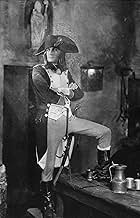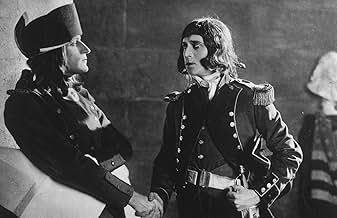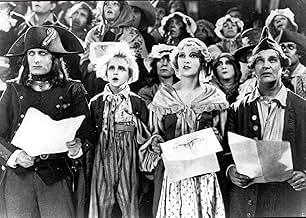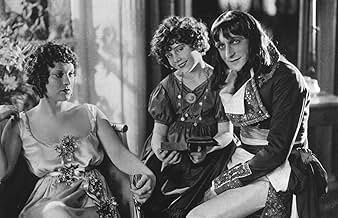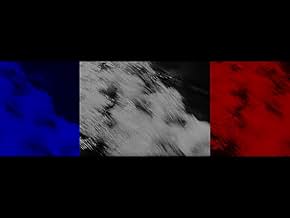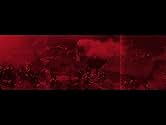AVALIAÇÃO DA IMDb
8,2/10
9,5 mil
SUA AVALIAÇÃO
Um filme sobre a juventude do general francês Napoleão e o início da carreira militar.Um filme sobre a juventude do general francês Napoleão e o início da carreira militar.Um filme sobre a juventude do general francês Napoleão e o início da carreira militar.
- Prêmios
- 4 vitórias no total
Nicolas Roudenko
- Napoléon Bonaparte enfant
- (as Vladimir Roudenko)
Max Maxudian
- Barras
- (as Maxudian)
Avaliações em destaque
Four showings at the art deco palace Paramount Theatre in downtown Oakland on March 24, 25, 31 and April 1 will be a landmark for cinemaphiles. From the opening snowball fight to the closing triptych of the eagle's shadow leading the Grande Armee, there was so much to love. Abel Gance takes you on a journey that your mind gets to ride with distinct pleasures. Robespierre in the John Lennonesque sunglasses, the teaching of the Marsailles, the dinghy with an escaping Napoleon and the General Assembly simultaneously in stormy seas, are but a few. I can't imagine I'll ever watch this on DVD after seeing it like I did. I certainly could never consider a sped up 24pp version. I watched Metropolis once like that and it just wasn't the same film. In fact criminal. So weirdly, I recommend the film but can't recommend seeing it unless a better format is available. I'm going to buy Carl Davis' score and play the film in my head from memory, which includes the crowd at the Paramount rising to their feet at the close shouting Vive La France! Vive La Gance!
... and remarkable even in it's current, truncated form. The film details the early life of Napoleon Bonaparte (Albert Dieudonne), from his unpleasant childhood in boarding school to his early military life during the French Revolution and the subsequent Reign of Terror, through to his first military victories and marriage to Josephine (Gina Manes). Also featuring Annabella and Abel Gance as Saint-Just.
Gance seems to have taken note of every cinematic technique of the previous 30 years of the medium, combining them all into a breathtaking, exhaustive epic that transcends the time of it's making while being wholly of it, as well. This could not exist with such strength as anything but a silent film, I feel, as the reliance on visual stimulus forced Gance into finding new and exciting ways to express emotion and mood. His early use of montage editing and super-imposition of imagery is stellar. The use of handheld cameras adds to the immediacy of the revolutionary scenes, conveying a newsreel touch that seems far advanced from other films of its day. The sets and costumes are very impressive, as is the cast of thousands. Dieudonne resembles Olivier's Richard III more than any other screen Napoleon that I've seen, but it works, and I wonder if this is the image I'll conjure in the future when thinking of the French military genius.
This movie has a storied existence, with multiple running times and edits throughout the decades. Gance's original version is said to have run over 9 hours, but subsequent edits ran as short as 115 minutes (the 1929 US release). Noted British film historian and preservationist Kevin Brownlow has made it his life's work to try and restore the movie as closely as possible to Gance's original vision. The version that I watched was the recently released BFI version, supervised by Brownlow, and it ran 333 minutes, or about 5 and a half hours. It's definitely a must see.
Gance seems to have taken note of every cinematic technique of the previous 30 years of the medium, combining them all into a breathtaking, exhaustive epic that transcends the time of it's making while being wholly of it, as well. This could not exist with such strength as anything but a silent film, I feel, as the reliance on visual stimulus forced Gance into finding new and exciting ways to express emotion and mood. His early use of montage editing and super-imposition of imagery is stellar. The use of handheld cameras adds to the immediacy of the revolutionary scenes, conveying a newsreel touch that seems far advanced from other films of its day. The sets and costumes are very impressive, as is the cast of thousands. Dieudonne resembles Olivier's Richard III more than any other screen Napoleon that I've seen, but it works, and I wonder if this is the image I'll conjure in the future when thinking of the French military genius.
This movie has a storied existence, with multiple running times and edits throughout the decades. Gance's original version is said to have run over 9 hours, but subsequent edits ran as short as 115 minutes (the 1929 US release). Noted British film historian and preservationist Kevin Brownlow has made it his life's work to try and restore the movie as closely as possible to Gance's original vision. The version that I watched was the recently released BFI version, supervised by Brownlow, and it ran 333 minutes, or about 5 and a half hours. It's definitely a must see.
I had the privilege of seeing the restored version of this film, to the accompaniment of a live orchestra under the baton of Carmine Coppola, in Los Angeles' un-air-conditioned war memorial. Despite uncomfortable seating and terrible heat, the experience of this four hour movie remains a watershed for anyone who attended. To think that because of the invention of sound, this masterpiece was partially destroyed by Abel Gance in a fit of depression, is heartbreaking. More shocking is that Gance's invention of Cinemascope - of which today only the end of the film retains in its triptych screen effect - was lost to filmgoers until its reinvention years later.
Obviously true art can't be hidden forever, and Gance did live to see Napoleon take its rightful place in cinematic history. Though it is many years later, I can still remember the tears and the ovation when the black screen with the white signature, "Abel Gance", signified the end of the film. A compelling and great work of art.
Obviously true art can't be hidden forever, and Gance did live to see Napoleon take its rightful place in cinematic history. Though it is many years later, I can still remember the tears and the ovation when the black screen with the white signature, "Abel Gance", signified the end of the film. A compelling and great work of art.
Modern film-goers are used to explication, to having everything explained for them. The art of visual story-telling -- where images and action indicate the emotional state of characters, rather than have the actor tell you how angry or sad or excited they are -- has almost been lost. But "Napoleon" is a masterpiece of visual art. (Writer-director Abel Gance was honored at the Telluride film festival a few years ago for this film. Far too late, in my opinion.)
The film tells the life of Napoleon Bonaparte -- the Corsican who adopts France as his homeland, rises to supreme general of the French armies during the Revolution and eventually seizes the seat of government itself (twice!). It starts out with a lengthy (if perhaps mythological) examination of Napoleon's childhood in a Catholic school. Snowball fights between Napoleon and two future foes portend the future. Napoleon's friendship with a pet eagle foreshadows his role as emperor of France. But even though these scenes represent more artistic license than history, they are tremendously well-acted by the young Vladimir Roudenko (as young Napoleon). Among the many innovations are some relatively naturalistic acting by the members of the cast and some jaw-dropping editing and montage sequences (especially during the brawl during the snowball fight and the fight in the sleeping quarters). Such innovative use of editing probably wouldn't be seen for another 30 or 40 years!
After almost an hour of this three-hour epic, we're transported to the period of the adult Napoleon -- acted with gravitas and iciness by Albert Dieudonne (who is among the cast's taller actors, just as Napoleon was in reality fairly tall, too). The film dwells extensively on the formative period when Napoleon first arrives in Paris during the late Revolution, focusing heavily on how the chaos in the city stamped into Napoleon the authoritarianism and dictatorial leadership traits that would emerge later in life. This is perhaps the highlight of the film. The editing and visual images create a swirling, spinning, mind-blowing effect that is extremely effective.
The film then focuses on Napoleon's return to Corisca -- whose people held allegiances to Spain and Italy as well as France, and where Napoleon faced imprisonment due to his French leanings. For anyone interested in learning more about the life of Napoleon, this segment is pretty eye-opening. It's followed by a sequence at sea that's amazingly effective in conveying the power and terror of a storm at sea. For its time, this film contained some powerful ocean footage (watch for those amazing low-angle shots, and the ingenious intercutting of the "angry storm" of the French assembly and Napoleon's tiny skiff tossed about on the stormy seas).
The final hour and a half of the film depicts Napoleon's rise in the army and his tenure as emperor of France. This is perhaps the portion of the film that most viewers would think of as "the story of Napoleon." But perhaps one of the reasons why this film is so fascinating is that it delves deeply into the formative episodes in Napoleon's early life and gives as much importance to them as to his later actions on the battlefield in Italy, his tenure as emperor, and his subsequent exile, return, and exile. And the film does so without being heavy-handed, un-subtle or overly expositive.
A restored version of "Napoleon" is making the rounds in the US in cinemas and on television. It contains a new musical soundtrack by Carmine Coppola, which is fairly good (although at times repetitive and too loud). The film was restored and re-edited by Francis Ford Coppola's Zoetrope studio. Zoetrope added some tinting (the ocean scenes are all blue, the "angry mob" scenes are all red) that is interesting but perhaps not quite the "restoration" some viewers might have had in mind.
Watch "Napoleon." You'll be very surprised at how modern the film is. Compared to other silent films of the 1920s, with the undercranked action, overly emotive acting, fantastic plots and theatrical make-up and costumes, "Napoleon" is years ahead of its time. Silent films require concentration to watch. "Napoleon" will keep your interest.
The film tells the life of Napoleon Bonaparte -- the Corsican who adopts France as his homeland, rises to supreme general of the French armies during the Revolution and eventually seizes the seat of government itself (twice!). It starts out with a lengthy (if perhaps mythological) examination of Napoleon's childhood in a Catholic school. Snowball fights between Napoleon and two future foes portend the future. Napoleon's friendship with a pet eagle foreshadows his role as emperor of France. But even though these scenes represent more artistic license than history, they are tremendously well-acted by the young Vladimir Roudenko (as young Napoleon). Among the many innovations are some relatively naturalistic acting by the members of the cast and some jaw-dropping editing and montage sequences (especially during the brawl during the snowball fight and the fight in the sleeping quarters). Such innovative use of editing probably wouldn't be seen for another 30 or 40 years!
After almost an hour of this three-hour epic, we're transported to the period of the adult Napoleon -- acted with gravitas and iciness by Albert Dieudonne (who is among the cast's taller actors, just as Napoleon was in reality fairly tall, too). The film dwells extensively on the formative period when Napoleon first arrives in Paris during the late Revolution, focusing heavily on how the chaos in the city stamped into Napoleon the authoritarianism and dictatorial leadership traits that would emerge later in life. This is perhaps the highlight of the film. The editing and visual images create a swirling, spinning, mind-blowing effect that is extremely effective.
The film then focuses on Napoleon's return to Corisca -- whose people held allegiances to Spain and Italy as well as France, and where Napoleon faced imprisonment due to his French leanings. For anyone interested in learning more about the life of Napoleon, this segment is pretty eye-opening. It's followed by a sequence at sea that's amazingly effective in conveying the power and terror of a storm at sea. For its time, this film contained some powerful ocean footage (watch for those amazing low-angle shots, and the ingenious intercutting of the "angry storm" of the French assembly and Napoleon's tiny skiff tossed about on the stormy seas).
The final hour and a half of the film depicts Napoleon's rise in the army and his tenure as emperor of France. This is perhaps the portion of the film that most viewers would think of as "the story of Napoleon." But perhaps one of the reasons why this film is so fascinating is that it delves deeply into the formative episodes in Napoleon's early life and gives as much importance to them as to his later actions on the battlefield in Italy, his tenure as emperor, and his subsequent exile, return, and exile. And the film does so without being heavy-handed, un-subtle or overly expositive.
A restored version of "Napoleon" is making the rounds in the US in cinemas and on television. It contains a new musical soundtrack by Carmine Coppola, which is fairly good (although at times repetitive and too loud). The film was restored and re-edited by Francis Ford Coppola's Zoetrope studio. Zoetrope added some tinting (the ocean scenes are all blue, the "angry mob" scenes are all red) that is interesting but perhaps not quite the "restoration" some viewers might have had in mind.
Watch "Napoleon." You'll be very surprised at how modern the film is. Compared to other silent films of the 1920s, with the undercranked action, overly emotive acting, fantastic plots and theatrical make-up and costumes, "Napoleon" is years ahead of its time. Silent films require concentration to watch. "Napoleon" will keep your interest.
Abel Gance's 'Napoleon' was premiered on April 7, 1927, at the Paris Opera House, the first movie to be accorded such an honor
It was been shown on a triple screen and to full orchestral accompaniment, running slightly under four hours
Impressive as it seems, it was conceived as the first of a six-part biography running many hours and tracing the life of Napoleon from childhood to the bitter end in St Helena Fortunately-for Abel Gance who directed and for us-the project was only completed to that moment where Napoleon enters Italy at the head of the French army, and the later and less pleasant aspects of his spectacular career were left unfilmed... The Little Corporal, after all, is a less controversial figure than the Emperor
Gance needed a figure as emblematic and powerful as 'Napoleon' to fulfill his dream of super cinema
'Napoleon' is a masterpiece of excess:
'Napoleon' is like one grand musical composition. It throbs with life
That was Gance the great filmmaker who thought that film could do everything and who said to Kevin Brownlow: 'For me, the cinema is not just pictures. It is something great, mysterious and sublime.' Brownlow is known now not only as an English filmmaker and film historian but also as a great restorer of silent films, notably Abel Gance's 'Napoleon.'
Impressive as it seems, it was conceived as the first of a six-part biography running many hours and tracing the life of Napoleon from childhood to the bitter end in St Helena Fortunately-for Abel Gance who directed and for us-the project was only completed to that moment where Napoleon enters Italy at the head of the French army, and the later and less pleasant aspects of his spectacular career were left unfilmed... The Little Corporal, after all, is a less controversial figure than the Emperor
Gance needed a figure as emblematic and powerful as 'Napoleon' to fulfill his dream of super cinema
'Napoleon' is a masterpiece of excess:
- The child Bonaparte keeps a pet eagle and wins a snow fight while at school in Brienne... In this sequence, the frame splits into nine subliminal images; as Napoleon watches his men entering Italy, the screen expands on each side to form a breathtaking panorama, then changes into three coordinated views of the scene
- The National Convention seems to sway and rock as Napoleon makes his escape from Corsica in a storm-tossed sailboat
- The Gallic of cabaret singers, Damia, leads French troops into battle personifying 'La Marseillaise'
'Napoleon' is like one grand musical composition. It throbs with life
That was Gance the great filmmaker who thought that film could do everything and who said to Kevin Brownlow: 'For me, the cinema is not just pictures. It is something great, mysterious and sublime.' Brownlow is known now not only as an English filmmaker and film historian but also as a great restorer of silent films, notably Abel Gance's 'Napoleon.'
Você sabia?
- CuriosidadesAbel Gance remembered one scene that was removed by the censors--that of the execution of civilians by soldiers. The camera is used like a bullet, zooming towards one human target, then another, then another. The sequence is lost, although a still photograph does survive.
- Erros de gravaçãoOne of the Corsicans in the inn states "Our fatherland is Italy with the Duke of Savoy". The Duchy of Savoy had ceased to exist in 1713 (eighty years earlier), when the Duchy acquired the Kingdom of Sardinia and the Duke then bore the title of the King of Sardinia. Italy was a geographic place not a political entity at this time.
- Versões alternativasThere are apparently at least 19 different versions of this film, starting with the original 6-hours cut (in a "triptych" format, requiring three projectors on three screens, called Polyvision). It has been shown in various formats and different running times, including a 1934 version re-edited by director Abel Gance and featuring an added soundtrack.
- ConexõesEdited into Napoléon Bonaparte (1935)
- Trilhas sonorasThe Thrill of Being In Love (Love Theme of Napoleon and Josephine)
Music by Carmine Coppola
Lyrics by Italia Coppola (USA version)
UK version: score by Carl Davis (based largely on works by Beethoven)
Principais escolhas
Faça login para avaliar e ver a lista de recomendações personalizadas
- How long is Napoleon?Fornecido pela Alexa
Detalhes
- Data de lançamento
- País de origem
- Idioma
- Também conhecido como
- Napoleon
- Locações de filme
- Domaine des Milelli, Ajaccio, Corse-du-Sud, França(Paolists' attack on Bonapartes' country house)
- Empresas de produção
- Consulte mais créditos da empresa na IMDbPro
Bilheteria
- Orçamento
- FRF 20.000.000 (estimativa)
- Faturamento bruto mundial
- US$ 39.448
- Tempo de duração
- 5 h 30 min(330 min)
- Cor
- Mixagem de som
- Proporção
- 1.33 : 1
Contribua para esta página
Sugerir uma alteração ou adicionar conteúdo ausente


